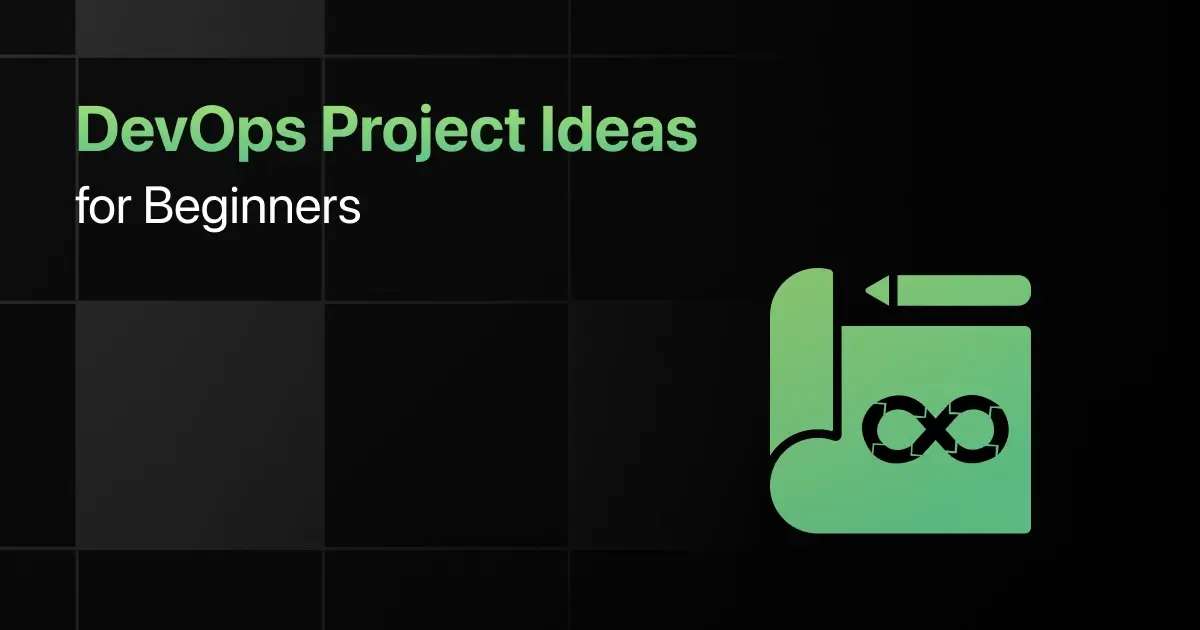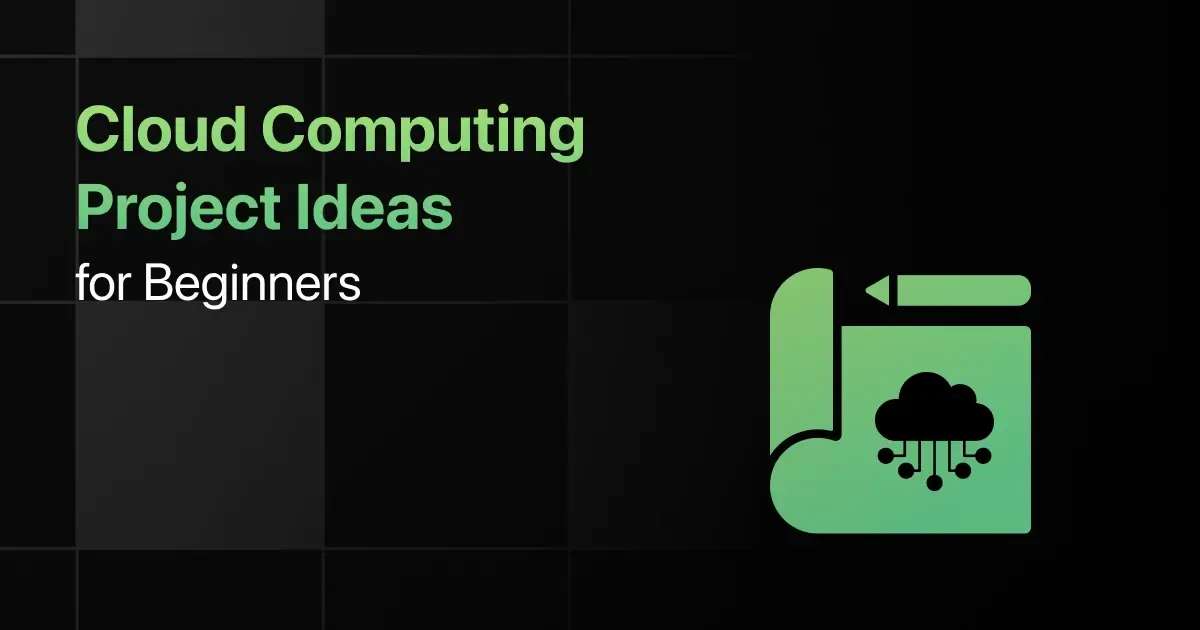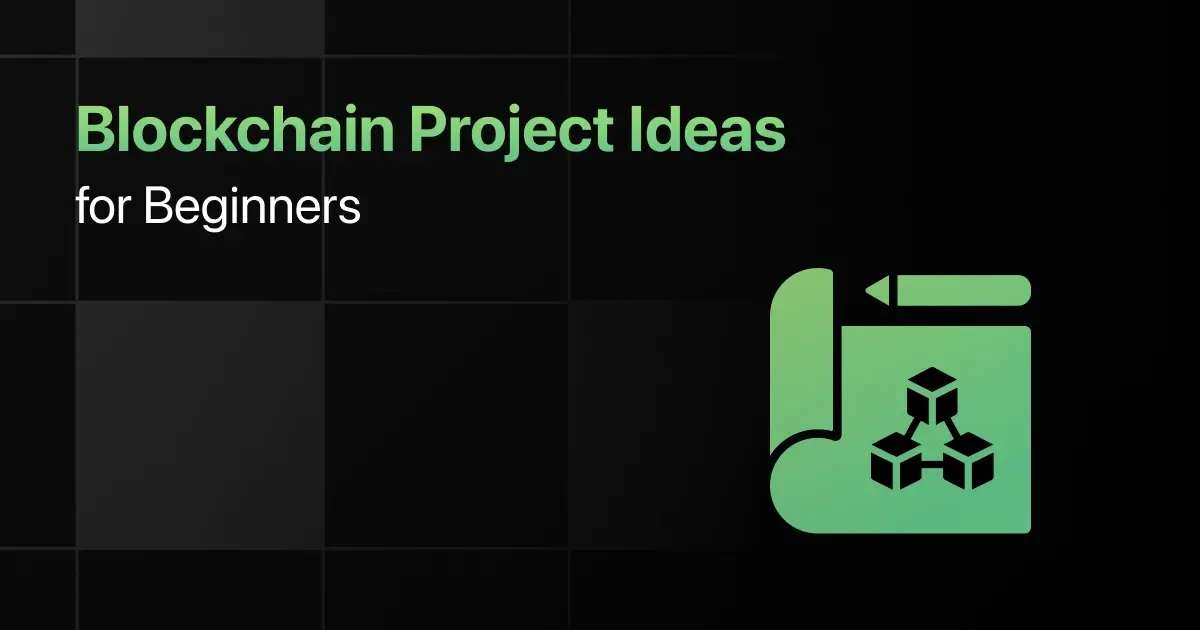Best DevOps Project Ideas for Beginners

Do you want to become a pro in the field of DevOps?
DevOps is the trending technology in the development environment and many people are learning it. But you can differentiate yourself from others in the same domain with DevOps projects for beginners.
Below are the simple DevOps project ideas for newbies! Read the article to know more about interesting projects.
10 Beginner-Friendly DevOps Project Ideas – Overview
Here’s an overview of the 10 best DevOps projects for beginners:
| S.No. | Project Title | Complexity | Estimated Time | Source Code |
|---|---|---|---|---|
| 1 | Simple Server | Easy | 4 hours | View Code |
| 2 | Jenkins Remoting | Easy | 6 hours | View Code |
| 3 | Git Branching and Source Code Management | Easy | 6 hours | View Code |
| 4 | Default Base Images with Docker | Easy | 8 hours | View Code |
| 5 | Containerization of a Java Project | Medium | 8 hours | View Code |
| 6 | CI/CD Pipeline using Azure DevOps | Medium | 10 hours | View Code |
| 7 | DevOps Lifecycle with AWS | Medium | 10 hours | View Code |
| 8 | Monitoring Dashboard for an Application | Medium | 10 hours | View Code |
| 9 | Scalable Application with Kubernetes & Docker | Medium | 12 hours | View Code |
| 10 | Kubernetes Cluster Deployment with Terraform | Medium | 12 hours | View Code |
Top 10 DevOps Projects for Beginners
Below are the top 10 DevOps projects for beginners:
1. Simple Server
This project involves setting up a basic server using cloud infrastructure.
You will learn fundamental DevOps practices, including server deployment and monitoring.
Duration: 4 hours
Project Complexity: Easy
Learning Outcome: Understanding of server deployment and monitoring.
Portfolio Worthiness: Yes
Required Pre-requisites:
- Basic knowledge of cloud platforms (e.g., AWS, Azure)
- Familiarity with Linux commands
- Understanding of network protocols (e.g., HTTP)
Resources Required:
- Cloud service account (AWS, Azure, etc.)
- SSH client
- Monitoring tools (e.g., Nagios, Datadog)
Real-World Application:
- Deploying web applications
- Monitoring server performance and uptime
2. Jenkins Remoting
This project focuses on setting up and configuring Jenkins Remoting to manage Jenkins build nodes.
You will learn how to enhance build processes and manage distributed environments in DevOps.
Duration: 6 hours
Project Complexity: Easy
Learning Outcome: Understanding of continuous integration workflows and node management.
Portfolio Worthiness: Yes
Required Pre-requisites:
- Understanding of Jenkins and continuous integration
- Basic Linux administration skills
- Familiarity with networking concepts
Resources Required:
- Jenkins server
- Virtual machines or physical computers as nodes
- Network configuration tools
Real-World Application:
- Managing and scaling build environments for software projects
- Automating deployment across multiple servers
3. Git Branching and Source Code Management
This project covers the implementation of efficient branching models using Git to enhance source code management.
You will learn advanced Git techniques and best practices for collaborative development.
Duration: 6 hours
Project Complexity: Easy
Learning Outcome: Understanding of advanced Git operations and collaborative workflows.
Portfolio Worthiness: Yes
Required Pre-requisites:
- Basic knowledge of Git and version control systems
- Understanding of command line usage
- Experience with collaborative projects
Resources Required:
- Access to a Git repository (e.g., GitHub, GitLab)
- Git software installed on local machine
- Documentation tools for version control guidelines
Real-World Application:
- Enhancing team collaboration and project manageability
- Maintaining stable production environments while developing new features
4. Default Base Images with Docker
This project involves creating and managing Docker containers using various default base images.
You will learn about Docker image selection and optimization for different application needs.
Duration: 8 hours
Project Complexity: Easy
Learning Outcome: Understanding of Docker containerization and image management.
Portfolio Worthiness: Yes
Required Pre-requisites:
- Basic understanding of Docker and containerization
- Familiarity with command-line interfaces
- Knowledge of basic software development principles
Resources Required:
- Docker installed on your local machine or a virtual environment
- Access to Docker Hub or other container registry
- Sample applications for container deployment
Real-World Application:
- Optimizing application deployment in cloud environments
- Ensuring consistency and efficiency in software delivery
5. Containerization of a Java Project
This project involves containerizing a Java application using Docker to enhance its portability and scalability.
You will learn to build and deploy Java applications within Docker containers efficiently.
Duration: 8 hours
Project Complexity: Medium
Learning Outcome: Understanding of Java application containerization and Docker workflows.
Portfolio Worthiness: Yes
Required Pre-requisites:
- Proficiency in Java programming
- Basic understanding of Docker and containerization principles
- Familiarity with build tools like Maven or Gradle
Resources Required:
- Docker installed on your local machine
- Java Development Kit (JDK) and a Java IDE
- Sample Java project with build configuration
Real-World Application:
- Simplifying deployment and testing of Java applications
- Ensuring consistent environments across development, testing, and production stages
6. Create a CI/CD Pipeline Using Azure DevOps
This project entails setting up a Continuous Integration and Continuous Deployment (CI/CD) pipeline using Azure DevOps.
You will learn how to automate the software delivery process, from code commits to production deployment.
Duration: 10 hours
Project Complexity: Medium
Learning Outcome: Understanding of CI/CD concepts and automation using Azure DevOps.
Portfolio Worthiness: Yes
Required Pre-requisites:
- Basic knowledge of DevOps and software lifecycle
- Understanding of version control systems, preferably Git
- Familiarity with scripting and automation tools
Resources Required:
- Azure DevOps account
- Access to a source code repository
- Tools for automation testing and deployment
Real-World Application:
- Streamlining the software development and deployment process
- Reducing human errors and improving deployment speed in production environments
7. Implement DevOps Lifecycle with Amazon Web Services (AWS)
This project focuses on implementing the complete DevOps lifecycle using various AWS services.
You will learn to integrate development, testing, deployment, and monitoring within the AWS ecosystem.
Duration: 10 hours
Project Complexity: Medium
Learning Outcome: Understanding of AWS-based DevOps practices and tools for automated, scalable deployments.
Portfolio Worthiness: Yes
Required Pre-requisites:
- Familiarity with AWS services like EC2, S3, and RDS
- Understanding of DevOps principles and practices
- Basic knowledge of scripting and automation
Resources Required:
- AWS account
- Tools for CI/CD such as AWS CodeBuild, CodeDeploy, and CodePipeline
- Monitoring tools like AWS CloudWatch
Real-World Application:
- Enhancing operational efficiency through automated deployments
- Maintaining high availability and scalable application infrastructure in the cloud
8. Create a Monitoring Dashboard for an Application
This project involves designing and implementing a monitoring dashboard to track the performance and health of an application.
You will learn how to use monitoring tools to gather and visualize key performance indicators.
Duration: 10 hours
Project Complexity: Medium
Learning Outcome: Understanding of application monitoring and data visualization techniques.
Portfolio Worthiness: Yes
Required Pre-requisites:
- Basic understanding of application development and deployment
- Familiarity with monitoring tools (e.g., Grafana, Prometheus)
- Knowledge of data visualization principles
Resources Required:
- Monitoring tools such as Grafana, Prometheus, or similar
- Access to application logs and performance data
- Server or cloud environment for tool deployment
Real-World Application:
- Proactive identification and resolution of application issues
- Enhanced decision-making through real-time data insights
9. Build a Scalable Application with Kubernetes and Docker
This project entails deploying a scalable application using Docker containers orchestrated by Kubernetes.
You will learn container management and scaling techniques suitable for high-demand environments.
Duration: 12 hours
Project Complexity: Medium
Learning Outcome: Understanding of container orchestration with Kubernetes and scalable application deployment.
Portfolio Worthiness: Yes
Required Pre-requisites:
- Proficiency in Docker containerization
- Basic understanding of Kubernetes concepts
- Familiarity with cloud environments, preferably with hands-on experience
Resources Required:
- Kubernetes cluster (can be minikube for local testing or a cloud service)
- Docker installation and container registry access
- Application code ready for containerization
Real-World Application:
- Ensuring high availability and scalability of applications
- Streamlining deployment and management of large-scale applications in cloud environments
10. Automate Kubernetes Cluster Deployment With Terraform
This project focuses on using Terraform to automate the deployment of Kubernetes clusters.
You will learn how to codify infrastructure setups and manage cluster deployments efficiently using Infrastructure as Code (IaC) principles.
Duration: 12 hours
Project Complexity: Medium
Learning Outcome: Understanding of Terraform for automated Kubernetes cluster deployments and IaC best practices.
Portfolio Worthiness: Yes
Required Pre-requisites:
- Basic knowledge of Kubernetes and its components
- Understanding of Terraform and IaC concepts
- Familiarity with cloud platforms, particularly those that support Kubernetes
Resources Required:
- Terraform installed on your local machine
- Access to a cloud provider that supports Kubernetes (e.g., AWS, Google Cloud, Azure)
- Code editor and version control system
Real-World Application:
- Streamlining the setup and management of Kubernetes clusters
- Enhancing the reliability and reproducibility of infrastructure deployments
Final Words
DevOps mini projects for beginners can help you build a strong portfolio to ace technical interviews. You can easily build scalable Industry 4.0 applications using DevOps.
Based on your experience and understanding of these DevOps projects for beginners, you can develop them further to suit your requirements.
Explore More DevOps Resources
Explore More Project Ideas
- Python
- Java
- C Programming
- HTML and CSS
- React
- JavaScript
- PHP
- C++
- DBMS
- SQL
- Excel
- Angular
- Node JS
- DSA
- Django
- Power BI
- R Programming
- Operating System
- MongoDB
- React Native
- Golang
- Matlab
- Tableau
- .Net
- Bootstrap
- C#
- Next JS
- Kotlin
- jQuery
- React Redux
- Rust
- Shell Scripting
- Vue JS
- TypeScript
- Swift
- Perl
- Scala
- Figma
- RPA
- UI/UX
- Blockchain
- Cloud Computing
FAQs
By applying to entry-level roles or internships, preparing skills relevant to the role, and understanding Amazon’s culture.
Yes! Freshers are hired across India in tech, operations, marketing, and more.
Typically, a bachelor’s degree, good communication skills, and domain or technical knowledge are required, depending on the role.
Through the Amazon Careers portal, campus placements, referrals, or internships.
Application → Online Assessment → Technical / Functional Interview → Behavioral Interview → Final Offer.
Study Leadership Principles, practice STAR answers, and work on problem-solving and communication skills.
Ranges from ₹4–10 LPA in India, depending on role and location, plus benefits and bonuses.
Related Posts


Best Selenium Project Ideas for Beginners
Are you interested in learning about the best framework for testing called Selenium? Then you are in the right place! Selenium …
Warning: Undefined variable $post_id in /var/www/wordpress/wp-content/themes/placementpreparation/template-parts/popup-zenlite.php on line 1050









